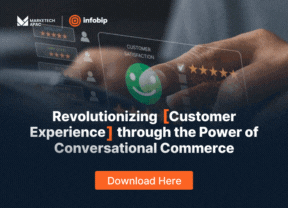Over the past year, businesses have had to adapt quickly to rapid technological change and economic uncertainty. Despite financial constraints in 2023, B2B chief marketing officers emphasize the importance of brand building and creativity to increase financial fluency, align with executives, and gain competitive advantage In this way, we tackled these issues.
This advancement establishes a strong foundation for marketing leaders in 2024, making adapting to the potential of generative AI especially important. Much like the internet revolution in the 1990s, AI is not only redefining work by increasing productivity, but also freeing up time to be creative and cultivate customer relationships. As audiences seek authentic connections, marketers will increase efforts to humanize brands to increase fairness and trust.
Here are three key transformative marketing trends that will shape the future of work in 2024.
- CMOs prioritize improving measurement frameworks
B2B CMOs are increasingly focusing on improving their business measurement frameworks. This focuses on evaluating and analyzing the effectiveness of different strategies to better understand their impact on business goals and outcomes. To navigate the changing landscape, B2B marketing leaders are specifically strengthening their financial acumen, with 83% learning the language of finance, according to LinkedIn's B2B Marketing Benchmark report. This reflects the trend of stronger CFO-CMO relationships, with 89% of B2B CMOs upgrading their skills to demonstrate the value of brand marketing to CEOs and CFOs. That's why brand-focused efforts will continue to be a priority for B2B marketers over the next 12 months.
- Marketers who utilize AI will have an advantage
Artificial intelligence (AI) is expanding its influence beyond the traditional boundaries of the technology sector and becoming more prevalent in marketing solutions. In LinkedIn's “Future of Work” report 90% of participants said they are likely to start or continue using AI in their marketing efforts. Among current users of AI, 61% said that their AI enabled them to generate more content in less time, and 53% said that their content was more engaging.
The APAC region is actively embracing this technology wave, with one in three B2B marketing leaders interested in integrating generative AI into their marketing efforts. A shocking 87% of APAC marketers believe AI will be a game-changer in supporting workloads, highlighting the transformative potential of AI, according to LinkedIn's latest survey. Masu.
Strategic adoption of AI in 2024 will be essential for CMOs who will increasingly need to demonstrate the impact marketing has on enterprise revenue and business measurement frameworks. AI technology can improve measurement accuracy, and AI is the key to showing the results of his B2B marketing efforts. This shift to AI-driven marketing allows for fresh and engaging audience engagement. Therefore, marketers should slowly integrate and experiment with AI into their workflows. This approach not only eases the transition through increased familiarity, but also helps maximize the return on your technology investment.
- Being authentic with a human-centered approach is key to building trust
It is most important to recognize AI as a tool in your marketing toolbox, rather than a replacement for human ingenuity. As the world's B2B marketing leaders plan to push new technologies, especially generative AI, in 2024, the key to success is to start small and simplify the integration process. By experimenting with familiar tools and gradually incorporating AI, marketers can ease the transition and increase the likelihood of success.
The more authentic your marketing campaign is perceived to be, the stronger your connection with your audience will be. This is reflected in the types of skills that B2B marketing teams are learning. Hard skills such as mastering marketing technology and data analysis are in high demand globally, but in APAC, skills such as storytelling and the ability to connect with the right audience (38%) and innovative thinking (34%) Soft skills are also gaining in popularity. The marriage of creativity and strategic use of AI is reshaping marketing and opening up new opportunities beyond traditional technology fields. Rather than viewing AI as a threat, marketing leaders must adopt a human-centered approach, viewing AI as an enabler rather than a replacement for human ingenuity.

This article is written by Matt Tindale, Head of LinkedIn Marketing Solutions, Enterprise APAC, LinkedIn.
This insight is published below as part of MARKETECH APAC's thought leadership series. What’s next in 2023-2024?. What’s next in 2023-2024? This is a multi-platform industry initiative where APAC marketing and industry leaders share marketing insights and predictions for the coming year..




